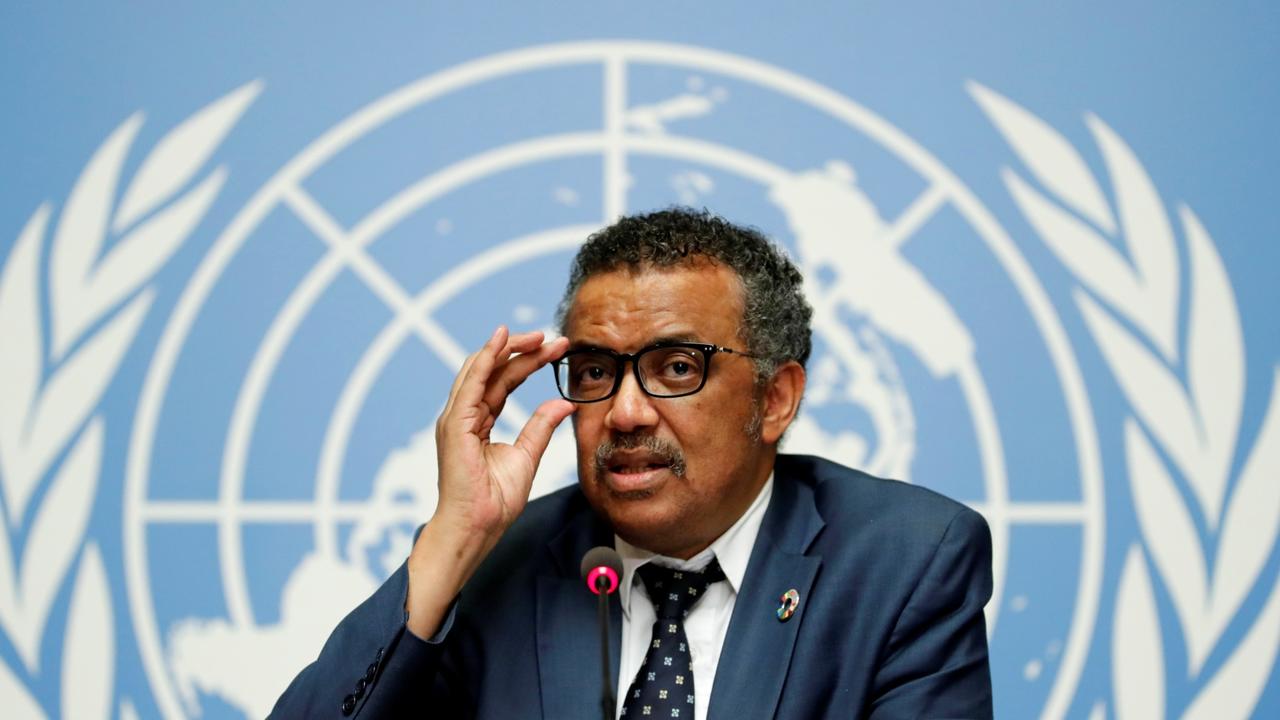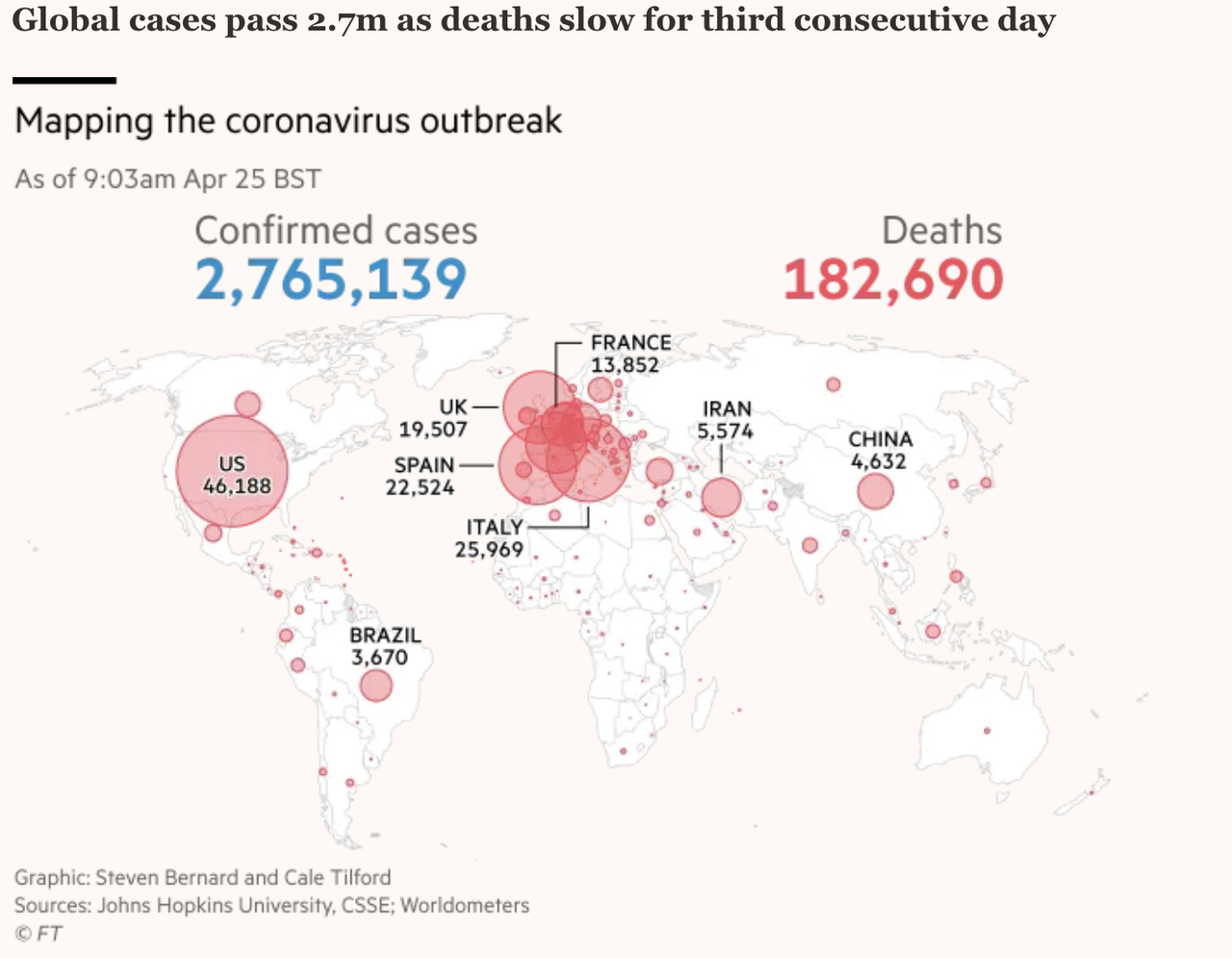WHO Warns Against "Immunity Passports", US COVID-19 Cases Near 1 Million Mark: Live Updates
Summary:
- WHO warns against "immunity passports"
- Global case total nears 2.8 million, deaths near 200k
- Brussels relaxes rules on state financing for companies
- US death toll passes 50k while total cases passes 900k
- Oregon finds its distancing measures may have prevented 70k infections
- Global single-day deaths declined for third-straight day on Friday
- Internet traffic is up 20% across Europe and US as lockdowns drag on
- Spain sees promising decline in deaths
- Former UK Chancellor urges gov't to share plan for reopening with the people
* * *
Bill Gates might want to rethink his decision to firmly defend the WHO against President Trump's decision to defund the organization - technically an arm of the UN - over allegations that it aided China's initial dissembling about the virus.
Gates and others have loudly cheered the expansion of surveillance methods to aid in efforts like 'contact tracing' and other advanced techniques to try and track who may or may not have been exposed to the virus. Many proponents of civil liberties, meanwhile, have argued that some of the more extreme measures in play offer little benefit in exchange for such a dramatic expansion of the security state.
One of this movement's favorite proposals is the "immunity passport", which would, in theory, allow those who are theoretically immune go about their lives while everybody else remains stuck inside.
In an announcement early Saturday in Europe, the WHO warned members against issuing so-called "immunity passports", essentially a document allowing individuals who test positive for coronavirus antibodies to return to work. The organization explained that - as we've noted numerous times over the past few months - there's no actual evidence that patients with antibodies - including those who've recovered from the virus, a group that includes at least 800,000 people - will be immune to reinfection.
"There is currently no evidence that people who have recovered from Covid-19 and have antibodies are protected from a second infection," the WHO said. The health agency said it is reviewing the evidence on whether people who recover from Covid-19 become immune, but that there are no studies on whether the presence of antibodies indicates immunity in humans. It said giving people who have antibodies special rights to travel or work "may therefore increase the risks of continued transmission."
Meanwhile, the number of confirmed coronavirus cases continues to expand at a roughly steady pace. Thankfully, the surge in daily fatalities observed over the past 2 weeks has finally begun to subside.
The FT reports that the worldwide COVID-19 death toll has risen by 6,182 on Friday to stand at 182,690. This is the third consecutive day where the number of new deaths has been lower than the previous day.
Still, if this pace of expansion continues, we should expect to see the global total pass the 3 million mark by Tuesday, if not earlier. Public health authorities from around the world reported 105,825 new cases yesterday, bringing the total to 2.76 million, according to data from Worldometers.
The global death toll is rapidly approaching 200k, with the US is responsible for 25% of them. As businesses in Georgia continue to reopen, the White House is debating a new legal liability shield for American businesses to prevent them from being sued over the coronavirus.
In the US, the number of deaths passed 50k on Friday while the case total passed 900k early Saturday, leaving the country well on the way to the 1 million case mark. The US would be the first country to report 1 million confirmed cases.
In Brussels, bureaucrats have rushed to relax state aid rules, and regulators have approved a series of multi-billion-euro schemes to allow member states to extend financing to companies - in some cases via direct equity injections - to help them weather the pandemic. Although leaders of both factions have told reporters that important progress was made at Thursday's virtual summit to work out the details of a massive pan-European relief program to help the worst-hit governments in the bloc. As one might expect, German and a handful of wealthy northern states have gotten into an intense disagreement with the poorer, worst-hit southern states (Spain, Italy joined in this instance by Emmanuel Macron's France) over how the program should be financed, and whether the loans should come in the form of loans, or outright grants.
As the country with the highest mortality rate in Europe, Spain has eased its lockdown measures only slightly, while warning that the current target date to begin reopening is May 9. But in a promising bit of news, the country reported fewer than 400 fatalities for the second consecutive day on Saturday (the count was accurate as of 9pm Madrid Time Friday) while the spread of new cases has also slowed.
Across Europe and the US, Internet traffic is up 20%, according to the FT and Media analytics group ComScore, which measured the number of unique page views and compared it with an "average" benchmark across several key markets.
With no end to a strict national lockdown in sight, millions of Britons are starting to get a little squirrely. To try to assuage these anxieties, former UK Chancellor Philip Hammond has suggested that No. 10 share its plan for reopening the economy with the public.
"The reality is that we have to start reopening the economy but we have to do it living with Covid," Mr Hammond told BBC’s Today. "We can’t wait until a vaccine is developed... and rolled out across the population. The economy won’t survive that long."
Now that the pace of new cases and deaths has slowed, it's clear that lockdowns and social distancing measures are pretty effective at slowing the virus's spread, which - remember - is the whole point of this: Eventually, scientists say, much of the global population will be exposed to this virus. It's just a question of whether that's going to happen over a few years, or a few months. In the latest positive indication, Oregon health officials have found that their state's aggressive social distancing measures may have prevented more than 70,000 cases since early March.
https://ift.tt/2VD1J2w
from ZeroHedge News https://ift.tt/2VD1J2w
via IFTTT






0 comments
Post a Comment